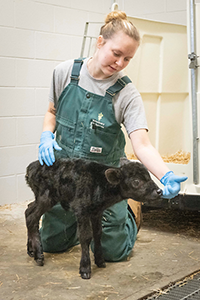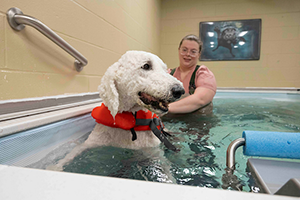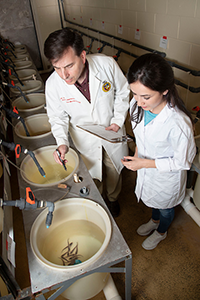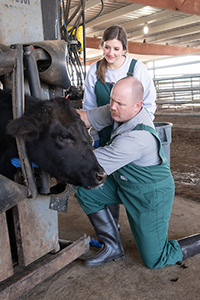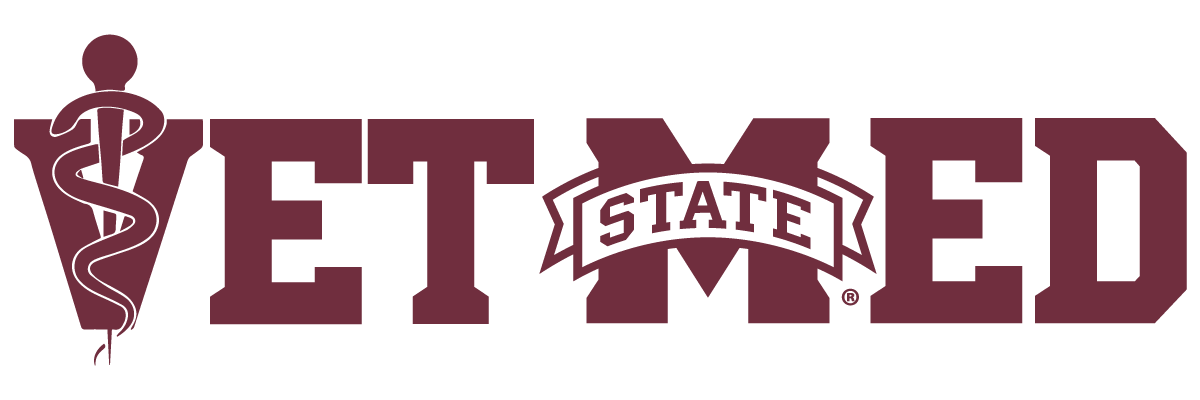VetMed at Work
Impacting Entrepreneurship and the Economy
The Mississippi State University College of Veterinary Medicine (CVM) is not just training veterinarians and veterinary students to practice veterinary medicine; is also helping them become entrepreneurs. The CVM is also an economic engine for the state and the region. According to the National Strategic Planning and Analysis Research Center (NSPARC), MSU generates nearly $4 billion in yearly economic impact, and nearly $2 billion of that is generated by the Division of Agriculture, Forestry, and Veterinary Medicine, which includes the CVM.
Cultivating Entrepreneurship
Mississippi State University’s College of Veterinary Medicine is directly cultivating entrepreneurship across the state through the Center for Rural Veterinary Practice (CRVP). Designed to address veterinary shortages in underserved Mississippi regions, the Center expands rural practice training by offering a certificate program and equips students and graduates with the tools they need to build and sustain rural practices. There are three components of the CRVP: 1) recruitment of youth into veterinary medicine, 2) focused rural practice training for veterinary students in the DVM program, and 3) coaching for graduate veterinarians in rural areas. clinical training and equips students and graduates with the tools to build and sustain rural practices. By integrating business training, financial planning guidance, and one-on-one mentorship with practicing veterinarians, the College is preparing graduates to succeed as both clinicians and small business owners. In partnership with MSU Extension, FFA, 4-H, and community leaders, the Center promotes pathways for students from rural backgrounds, supports new graduates in practice ownership, and strengthens local economies by ensuring veterinary practices thrive as viable, community-rooted enterprises.
Dr. Veronica List is an example of a recent CVM graduate who is making an impact in a rural area of Mississippi.
Showing their support to encourage veterinarians to practice in rural areas of the state, the Mississippi state legislature created the Dr. Mac Huddelston Rural Veterinary Scholarship Program, which pays full tuition for two Mississippi native Doctor of Veterinary Medicine students per year. In return for the scholarship, the recipients agree to spend four years practicing in rural Mississippi. Funds have also been provided by the State to improve large animal facilities at the MSU CVM and enhance training for rural practice. A new outpatient cattle handling facility and farm animal hospital are under construction and will open in 2027.
The College of Veterinary Medicine works hand in hand with the rest of the Department of Agriculture, Forestry, and Veterinary Medicine (DAFVM) to promote entrepreneurship and economic growth in the state of Mississippi.
Day One Ready
The College of Veterinary Medicine prides itself on producing prepared veterinary professionals. The CVM trains veterinary professionals through the Doctor of Veterinary Medicine (DVM) program and the Veterinary Medical Technology (VMT) program. The DVM is a professional degree that students attain after completing their undergraduate studies and four years of veterinary school, and the VMT program is a four-year Bachelor of Science program. These programs prepare day-one ready veterinarians and veterinary technologists (‘vet techs’) to enter the workforce in Mississippi and surrounding states.
Our two-by-two DVM curriculum means students spend two years learning in the classroom and two years on clinical rotations. We say that clinics are our classroom because students learn by doing as they work alongside our faculty clinicians. Veterinary students and VMT students graduate with extensive hands-on experience. By the time that our veterinary students complete their DVM program, they have performed over 90 surgeries on average, far exceeding the national norm, where graduates from other veterinary programs may have completed only two or three surgeries. They also consistently excel on the North American Veterinary Licensing Examination (NAVLE). With this depth of experience and competence, they are prepared to enter practice with confidence and make an immediate impact on day one.
A Hospital System Reaching Across the State
Service is one of our core missions and our hospitals provide medical, surgical, and reproductive services for large and small animals. The Animal Health Center in Starkville operates a large animal hospital for farm animals and horses, and a small animal hospital for dogs and cats. The Animal Emergency and Referral Center in Flowood, Mississippi is a small animal hospital that serves the Jackson region. Our hospitals are major employers of veterinarians, veterinary technologists, and other trained staff in Mississippi.
Advancing Aquatic and Poultry Health
The state’s laboratory system, operated by MSU CVM, includes the Mississippi Veterinary Research and Diagnostic Laboratory, Poultry Research and Diagnostic Laboratory, and Aquatic Research and Diagnostic Laboratory. Given Mississippi’s leadership in aquaculture and poultry production, CVM research plays a critical role in sustaining two of the state’s most valuable industries. From investigating new vaccines for fish diseases to developing new diagnostic tests for poultry operations, diagnosticians and researchers help safeguard industries that employ thousands and generate billions in revenue.
Research that Promotes and Advances Agriculture
CVM researchers are national leaders in antimicrobial stewardship, disease surveillance, and livestock management. In partnership with the United States Department of Agriculture, they are advancing research that safeguards the state and nation’s food supply while creating new tools and methods to support producers. Current projects include developing vaccines, improving nutrition strategies, and designing precision agriculture technologies that help farmers make data-driven decisions. These innovations enhance animal welfare, strengthen herd health, boost farm productivity, and increase profitability for Mississippi’s agricultural community.
